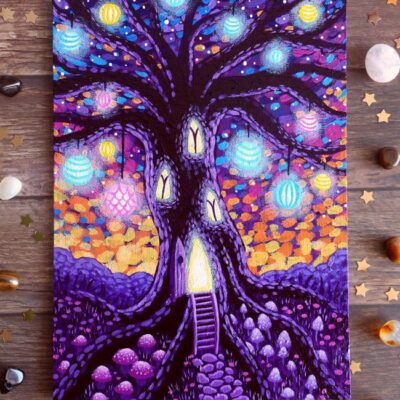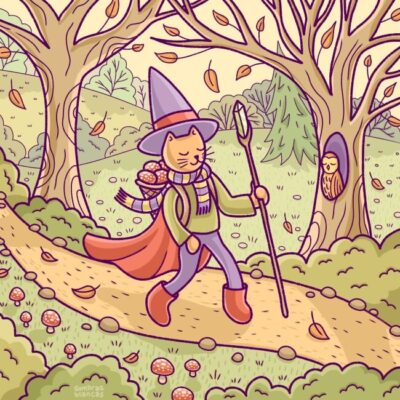08 Dec Book review: ‘Lolly Willowes’ by Sylvia Townsend Warner
 Do you know those times when planets align and a book you were going to like anyway comes to your life in just the perfect moment? I, not being much of a re-reader, broke my own rules by starting this one again as soon as I finished it (and I’ve read it several times since). Spoilers ahead.
Do you know those times when planets align and a book you were going to like anyway comes to your life in just the perfect moment? I, not being much of a re-reader, broke my own rules by starting this one again as soon as I finished it (and I’ve read it several times since). Spoilers ahead.
This little book is a bright hymn to female emancipation and the breaking of conventions, all set in a social and temporal background in which we are not used to seeing these ideas being developed. Laura Willowes is introduced to us as a kind, smart girl (even though not everyone sees her that way) much more interested in books and the natural world than dresses and suitors. Under the wing of a father who adores her, Laura can develop her interests without major obstacles but after his death, she will have to move to London to live with his brother’s family, losing her independence and the beloved nature surrounding her childhood home.
“So Laura read undisturbed, and without disturbing anybody, for the conversation at local tea-parties and balls never happened to give her an opportunity of mentioning anything that she had learnt from Locke on the Understanding or Glanvil on Witches. In fact, as she was generally ignorant of the books which their daughters were allowed to read, the neighboring mammas considered her rather ignorant. However they did not like her any the worse for this, for her ignorance, if not so sexually displeasing as learning, was of so unsweetened a quality as to be wholly without attraction.”
Her life in London ends up being a succession of tediously organized, dull days (years). Her new family, who never understood her, quickly assigns her the role of the spinster who helps with the house chores and her nephews and nieces. Bit by bit, Laura stops giving in to her natural impulses to become aunt Lolly, silencing an inner world that is out of place in her new reality.
“Sin and Grace, and God and the- (she stopped herself just in time), and St. Paul. All men’s things, like politics or mathematics. Nothing for them except subjection and plaiting their hair. And on the way back they listened to more talk. Talk about the sermon, or war, or cock-fighting; and when they got back, there were the potatoes to be cooked for dinner. It sounds very petty to complain about, but I tell you, that sort of thing settles down on one like a fine dust, and by and by the dust is age, settling down.”
After many years of leading this lethargic existence, a series of signs awaken in Laura her old determination and she decides to move to a little rural town, much to the astonishment of her family. Great Mop stands before the protagonist as the final destination in which to find that something she has always felt but cannot yet name. The beauty of the vast landscapes and green meadows will soon be clouded by the visit of her nephew Titus, who decides to stay and live in the village, breaking again the long-sought solitude of Laura. I especially liked one of the ideas developed in this part of the book: that someone can spoil your relationship to a place simply by understanding it differently, by invading your vision of it until it is no longer special.
“There was no question of forgiving them. She had not, in any case, a forgiving nature; and the injury they had done her was not done by them. If she were to start forgiving she must needs forgive Society, the Law, the Church, the History of Europe, the Old Testament, great-great-aunt Salome and her prayer-book, the Bank of England, Prostitution, the Architect of Apsley Terrace, and half a dozen other useful props of civilization.”
Sunk into relentless despair and in a fantastic and very needed turn of events, Laura adopts a familiar in the shape of a cat and makes a pact with the Devil, finally accepting her own status as a witch. In this figure of the Devil, which is presented to us in various forms, we see no trace of the evil creature portrayed by Christianity, but rather a representation of the god Pan, pure nature that honors free will and personal pleasure. From our current perspective, this emphasis on contact with the natural world can be seen as the second great claim of this book. Everything expires; buildings crumble down over time but nature remains.
“The Vatican and the Crystal Palace, and all the neat human nest-boxes in rows, Balham and Fulham and the Cromwell Road –he saw through them, they went flop like card-houses, the bricks were earth again, and the steel girders burrowed shrieking into the veins of earth, and howled through the streets of Paris, the foxes played in the throne-room of Schönbrunn, and in the basement at Apsley Terrace, the mammoth slowly revolved, trampling out its lair.”
After a series of mild interventions by Laura’s new master, her nephew ends up leaving Great Mop to get married in London. At the age of 47 and after a personal quest full of meanders and obstacles, Laura can finally be free. Free to enjoy her time, the nature that surrounds her, to be left alone and savor the gentle satisfaction of knowing she is the master of her actions. In her conversations with Satan, she reveals her ideas about religion and the patriarchy and tells us that one doesn’t become a witch to do evil nor to do good, but precisely to escape from all that and be able to live life for oneself.
“Some may get religion, then they’re all right, I expect. But for the others, for so many, what can there be but witchcraft? […] And they are all so accustomed, so sure of her! They say: ‘Dear Lolly! What shall we give her for her birthday this year? Perhaps a hot-water bottle. Or what about a nice black lace scarf? Or a new workbox? Her old one is nearly worn out.’ But you say: ‘Come here, my bird! I will give you the dangerous black night to stretch your wings in, and poisonous berries to feed on, and a nest of bones and thorns, perched high up in danger where no one can climb to it.’ That’s why we become witches: to show our scorn of pretending life’s a safe business, to satisfy our passion for adventure.”
The magical elements that come into play in the second half of the book are but a symbolic representation of what the myth of the witch has always concealed: the emancipation of the woman as an independent being with the power to act on her own and influence the world. I am very happy to have found this jewel that is now among my favorite books and I am also very happy to live in a time when it is less and less necessary to resort to a pact with the Devil in order to be a woman with her very own way of understanding life.
I translated this piece from my book review blog (originally in Spanish).
This journal is intended to be a collage of topics that inspire me. If you would like to get notified whenever I post new content, feel free to subscribe to my email list. Thank you for reading!


 The Fairy Tree
The Fairy Tree
 Green Witch
Green Witch
 Wizard Cat
Wizard Cat
 Silent Guardian
Silent Guardian